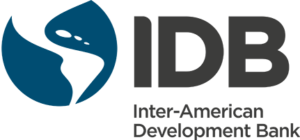Inter-American Development Bank
Challenge #1
The Inter-American Development Bank (IDB) is a leading source of development financing for Latin American and the Caribbean, providing loans, technical assistance and policy guidance to countries in the region to promote its goals of poverty reduction and sustainable development. Over time, the Bank has accumulated a large store of knowledge on substantive topics and on the countries with which it has worked. The knowledge produced and acquired by the Bank has been used to improve the development effectiveness of its interventions. The Bank recognized the need to apply this knowledge in a more consistent and systematic way and to make it available to a wider audience, both inside and outside of the Bank.
The Bank developed a methodology to systematize “key learnings” that emerge from the Bank’s operational experience and analytical work, to then make that learning available in an organized manner to Bank staff and clients. The Bank competitively bid services to (1) review the methodology and (2) provide specific recommendations for its improvement, benchmarking and integrating effective practices of other organizations while optimizing the relevance of the products of the methodology.
Solution
Working closely with Bank staff, Working KnowledgeCSP delivered the following solution:
- Designed and completed a comprehensive review protocol of the Bank’s lessons learned methodology.
- Assessed the extent to which the methodology has been successful in identifying and documenting lessons /key learnings not only from the Bank’s operations, but also within their operating regions’ operational experience and analytical work.
- Benchmarked the methodology with a relevant cross-section of effective practices from other organizations in capturing, systematizing, and disseminating “key learnings.”
- Recommended strategies and practices to enhance the relevance, usefulness, and impact of the knowledge captured and disseminated through the methodology.
We addressed the following:
- Methods of knowledge analysis and systematization quality control processes
- Online publication and dissemination tools and practices
- Conceptual role and value within the context of the IDB’s Knowledge and Learning Strategy objective to “consolidate an organizational culture of continuous learning” as part of work flow
- How the methodology compares/benchmarks in the above areas against established effective practices in comparable institutions
- Improving IDB lessons learned practices/processes and the “linking” of the methodology and its products with other effective knowledge capture and dissemination practices to increase their impact and value
- Presentation to staff across the Bank discussing the findings and recommendations seeking feedback.
Value
The Bank’s lessons learned capture and reuse capability has been improved in the following ways:
- Improvement in in the impact of knowledge dissemination
- Access to knowledge is improved (access, just-in-time knowledge on demand)
- Increase in visibility and perceived value by knowledge seekers
Challenge #2
The Bank developed and implemented a process to support the work of formal vs. informal special committees and working groups mandated by the Board of Governors and to assist in the decision-making necessary for mission delivery. The Bank wanted to identify and document what worked well and what could be done differently in the future to improve the efficiency and the effectiveness of the committee processes.
Solution
Working KnowledgeCSP designed and facilitated a Retrospect, a “learning after doing” Fast learning methodology, to capture the insight, experience, and learning of the process participants. We made sense of the captured (elicitation) knowledge and developed and codified specific learnings and advice to be used in the future by any process participant. We also developed a process map to guide future training and lessons learned capture and improvement. The Bank used the learnings to make immediate changes in the process and the committee support workflow.
As part of this solution, Working KnowledgeCSP also developed and delivered a training class on Retrospect Design and Facilitation so that the bank can continue using this effective “learning after doing” practice and continuing basis.
Value
The Bank committee support process has been improved based on an improved ability to “learn after doing.” The Retrospect, a team meeting called after completion of a piece of work, a project phase, or a project, provides the Bank the opportunity and capability to continually capture the new knowledge of the team and to plan the retrospect into the process so that it is viewed as part of the way work is accomplished, not extra work. The benefits to the Bank of integrating retrospects into their workflow are:
- Identification of valuable lessons
- Enhanced team openness and cooperation
- Achievement of closure at the end of a project or sequence.


